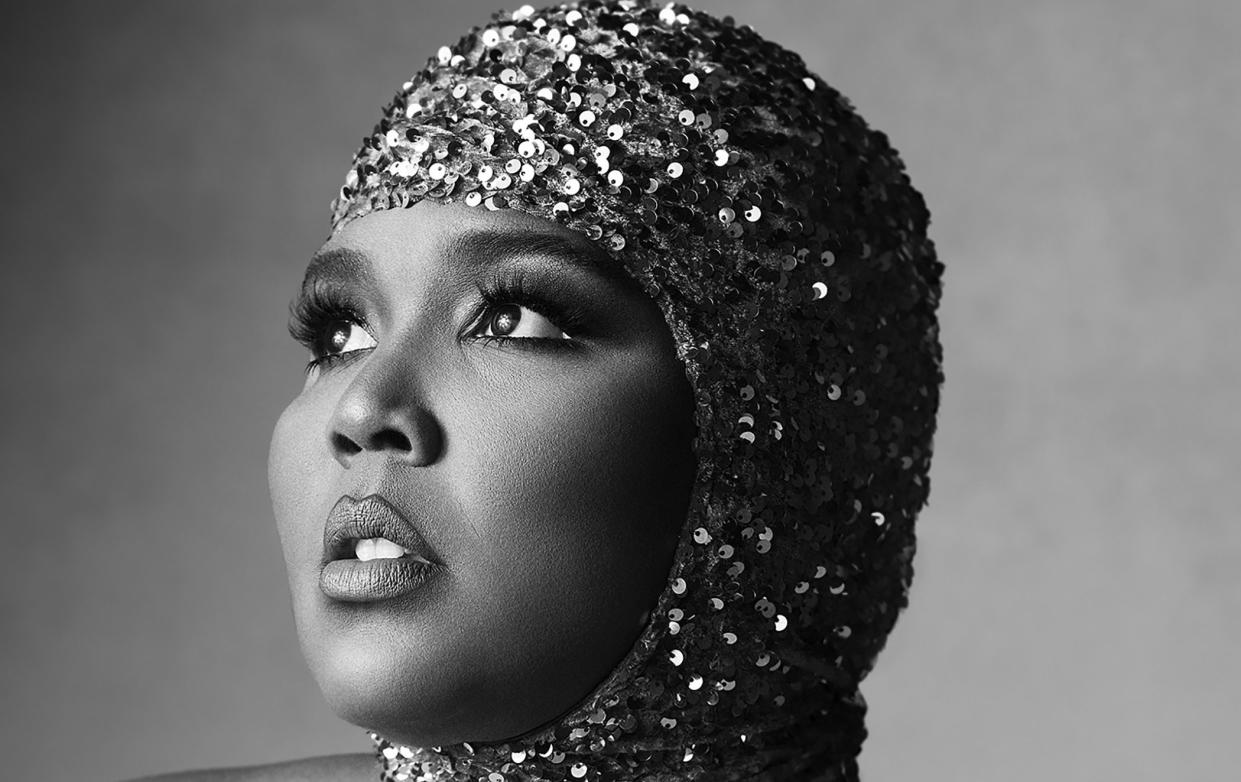Lizzo strikes pop gold, and Mabel has a big night out – the week’s best albums

Lizzo, Special ★★★★☆
There’s no denying Lizzo’s talents: rapper, singer, classically trained flautist, energetic performer – and saleswoman. She sells every single beat and syllable of her songs – self-empowerment ballads and feel-good commercial hits – with enough charisma to outshine the sun, or at least become a Grammy-winning global pop phenomenon. With buzzy hit Juice she defined 2019, the year the world finally caught up to the then-31-year-old Detroit artist after years of sweat, reinforcing her hard-earned stardom with multi-platinum single Truth Hurts.
Special, her fourth album and second major-label release, plunges readily into the grab-bag of Lizzo tricks: hooks, laughs, one-liners, the occasional “sheesh”. Her lyrics are playful and easy to parse, as she extols the virtues of self-love and positivity, rising above the racists, sexists and fatphobics who constantly blight her career.
Sometimes, Special strikes pop gold. Lead single About Damn Time – her highest charting hit so far – is a basic disco bop, but done well, with the added bonus of a moreish, Lizzo-ish flute riff. She smoothly interpolates samples from Lauryn Hill and William Bell on Break Up Twice, sways through dancefloor number Everybody’s Gay, and brings back the glory of the 1980s key change on 2 Be Loved. About damn time indeed.
Some tracks are less successful, from misstep Grrls to the plod of I Love You Bitch. And though it should be a powerful, hard-won celebration of black womanhood and feeling good in your own skin, Naked is let down by its slightly clumsy lyrics. Elsewhere, the album threatens to melt into generic mid-tempo soul and pop.
But this is Lizzo, and her charismatic force keeps things afloat. Music destined for a group workout class or M&S Christmas advert, maybe, but executed to a high standard and providing precious confidence and joy to a lot of people – and really, who can argue with that. Kate French-Morris

Mabel, About Last Night... ★★★★☆
Timing is everything in pop culture. This second album from 26-year-old British-Swedish singer-songwriter Mabel lands in the midst of a hectic hot summer, and it sweeps us through the anticipation, confrontation and revelation of a big night out, without missing a beat.
The themes are relatable; the tracks are slick pop dance productions with savvy collaborators (Raye; Jax Jones and Galantis; MNEK; StarGate). There are bright flourishes: strings, pulsing Euro beats and classic house piano riffs. Still, it’s Mabel who steals the spotlight, sounding gloriously assertive, upbeat and charismatic on storming tunes including Animal (which recalls Nelly Furtado’s noughties anthem Maneater), and the exuberant Let Them Know (where Mabel is at her sassiest yet: “I got a new man in my business/ And he all about his business/ And his name is none of your business”).
It's a delight to hear Mabel on such powerfully expressive vocal form here; it sounds like she’s having a blast, and that spirit is infectious. At this stage in her successful career, she’s established a pop identity distinct from her parents (Neneh Cherry and Cameron McVey), but at the same time, she draws creative influence from her upbringing, and has cited the inspiration of pioneering stylist and close family friend Judy Blame.
Mabel also retains the tender, thoughtful quality that infused her debut album High Expectations (2019), and this makes for an impressively nuanced flow. The bittersweet interlude Take Your Name is about the promise of what might have been until a relationship turned toxic, before we’re spirited back to the dancefloor for the disco-fuelled Let You Go. Even as her night draws to a close, there’s a playful end-note (LOL) and a joyful lingering buzz. Arwa Haider
Beabadoobee, Beatopia ★★★☆☆
It’s not enough for Gen-Z artists to simply make their own music. From Eighties-loving Harry Styles to disco diva Dua Lipa, they are also proving to be successful curators of the past. Helming the Nineties revival is 22-year-old British-Filipino pop singer Bea Kristi, aka Beabadoobee. And her devoted following is copying her every hairclip.
Kristi’s music may sound fresh to the ears of those born this side of the millennium, but it’s rehashed, scrubbed-up, 1990s alt-rock to everyone else, so well-cribbed she sounds like a fictional artist dreamed up to soundtrack a teen movie.
Promptly signed to record label Dirty Hit in 2018 after the first song she wrote, Coffee, became a twice-viral hit, Kristi embraced glittery Nineties grunge on her 2020 Top 10 debut album Fake It Flowers. But follow-up Beatopia – named after the imaginary world she created as a child – sinks back into her earlier mellow, mid-tempo style, from lackadaisical jam Beatopia Cultsong to Dido-esque Sunny Day and scuzzy number See You Soon.
Ballads like Ripples and Lovesong barely make a dent, although the bossa nova lilt of The Perfect Pair and pop beat of Tinkerbell Is Overrated fare better. Matty Healy of prominent labelmates The 1975 co-writes a couple of tracks, but his influence overwhelms the album’s delicate palette.
Beatopia could do with more of the noise of its predecessor, if only to hide sins like rhyming “warn ya” with “California” on Lily Allen-ish track You’re Here That’s The Thing. One noisier spell, Talk, references Avril Lavigne’s 2002 pop-punk hit Complicated. “Lay back, it’s all been done before,” Lavigne sang on that track – a mantra for Beatopia if ever there was one. Kate French-Morris

Black Midi, Hellfire ★★★☆☆
It’s not only pop divas like Adele, Amy Winehouse and FKA Twigs who graduate from the Brit School. The original four members of Black Midi came together as students there in the late 2010s, and have since pursued a waywardly experimental path. Their early gigs weren’t too dissimilar to Captain Beefheart’s notoriously indigestible benchmark, Trout Mask Replica, and their ensuing two Rough Trade albums housed hectic, herky-jerky song structures which had reviewers grasping for new genre titles like ‘post-punk prog-rock’ and ‘post-everything’.
Perhaps eager to create some distance from those Brit School origins, Black Midi can be outspoken in separating themselves from the pop mainstream. In a recent interview, ever-uncompromising frontman Geordie Greep described Ed Sheeran as “a greedy piece of shit”, who makes “the worst music of the last 100 years.”
When I saw the group onstage at St John-at-Hackney Church in May 2021, the first Covid lockdown seemed to have driven them into a frenzy of indecision about their own direction, as they hurtled through musical styles – jazz, reggae, folk, blues and more – whilst all dressed in chef’s whites. At that point, they were an instrumentally gifted ensemble who urgently needed to simmer down and figure out who they were as artists.
Now stripped down to a trio, with guests, their third album goes some way towards answering that question. While still manic in its tempo-changing lunacy, Hellfire is more approachable and organised, as the production by sometime Björk engineer Marta Salogni asserts a certain order amid the vari-speed chaos.
In bassist Cameron Picton’s songs, Still and Eat Men Eat, orchestrally enhanced passages bring a beatific West Coast calm reminiscent of Love’s hippie-era classic Forever Changes, while Welcome To Hell, despite its forbidding title, hinges on a scratchy Greep guitar riff which recurs sufficiently often to accrue something hitherto entirely absent from Black Midi’s music: groove.
With some of the cacophonous clutter excised, Greep in particular emerges as a storyteller dealing in grotesques. In the nightmarishly clanging finale, 27 Questions, he wonders “Does there exist a marriage that can survive castration?”. With his sing-speaking narrative style, he actually resembles a Broadway crooner – from hell. Andrew Perry

Interpol, The Other Side Of Make-Believe ★★★☆☆
Unlikely survivors of the early 2000s New York indie-rock scene, Interpol were the darkly attired, Joy Division-fixated misfits who nobody paid too much attention to initially, while the Strokes and the Yeah Yeah Yeahs conquered the mainstream. Over time, like The Cure in the 1980s and Placebo in the 1990s, these black-suited grumps managed to invent their own route to commercial success without having to behave like shiny-happy sellouts – the outsiders at the pop party, a kind of overgrown and uncompromised cult act.
An Anglo-American membership (smouldering singer Paul Banks, who for some years dated the model Helena Christensen, was born in Clacton-on-Sea) gives Interpol a mid-Atlantic sound, never wholly British or Stateside in its alt-anthemicism, but connective the world over as an antidote to regular chart fodder.
For this seventh album, Interpol conducted most of the recording in north London with production giants Flood and Alan Moulder (Nine Inch Nails, Depeche Mode), who bring an awkward but never unpalatable drama to the sound. Banks’s familiar bark is dialled down to a more intimate, almost conversational tone, high up in the mix, consciously dispensing lyrics of greater warmth and tenderness in the face of the pandemic’s brutality.
Still, the trademark combination of Daniel Kessler’s angular arpeggiated guitar, Sam Fogarino’s ungainly post-punk beats and Banks’s ever-melancholy way with melody remains fundamentally in place on big-hitters like Fables. There, images of “tails of meteors” and “guileless angels” reflect Interpol at their most sky-scraping and ambitious, in the slightly wonky, otherworldly vein of Achtung Baby-era U2.
While there’s a whiff of disco about opener Toni’s rhythm and climactic falsetto (“Still in shape, my methods refined” runs one rather apposite lyric), and Something Changed hinges on maudlin piano, The Other Side of Make Believe scarcely risks driving away disciples. Nor does it cravenly go after fresh converts. As such, survival is ongoingly assured. Andrew Perry
Steve Lacy, Gemini Rights ★★★☆☆
Notching comparisons to Stevie Wonder and Prince before you’ve hit the beer-gut period of your twenties is no mean feat. For 24-year-old Compton wunderkind Steve Lacy, who’s been turning out ear-catching pop-funk since he was big enough to lift a guitar, it looks remarkably easy.
He’s perhaps best known for teasing the funkier psychedelic tendencies out of major-name rappers like Kendrick Lamar and YG – sprinkling an added dash of camp onto the G-funk swagger – and for his work with R&B supergroup The Internet. On Gemini Rights, his second solo album proper, Lacy returns to a familiar well of sexy debauchery and smooth licks, while unpicking the emotional aftermath of a recent break-up.
At least one way in which the Prince comparison stands up is that Steve Lacy is, on all present evidence, incredibly horny. He sings about dicks the size of “a cannon”, and interrupting shopping trips to “f--k in the back of the mall.” But despite the smut, he pursues sex for its romance (for the cuddles afterwards, he said in a recent interview). You can hear that tenderness come through in the harmonies on Helmet. “Loving you was a hazard, so I got my heart a helmet,” he purrs.
It is, of course, a coincidence that this album arrives in the midst of an alarming UK heatwave. But that doesn’t make its drifty, lounging, colour-swilling sound any less suited to stretching out and basking in an enormous, painfully chic sun hat. It’s music that will make a bulbous glass of something sweet and fizzy and icy (and strong) somehow sit even more comfortably in a cupped palm.
Experiments with cumbia rhythms and autotuned vocal trills on Mercury, and the bop and twist on Sunshine – which features a head-turning guest appearance from Fousheé – only increase the heat. The novelty of the velvety lounge-funk and smut pairing can wear thin at times (the horn reels truly out of control on Amber), but for the most part these high camp delectations are engrossing. A sexy pop chameleon already well in the making. Will Pritchard

 Yahoo News
Yahoo News 
